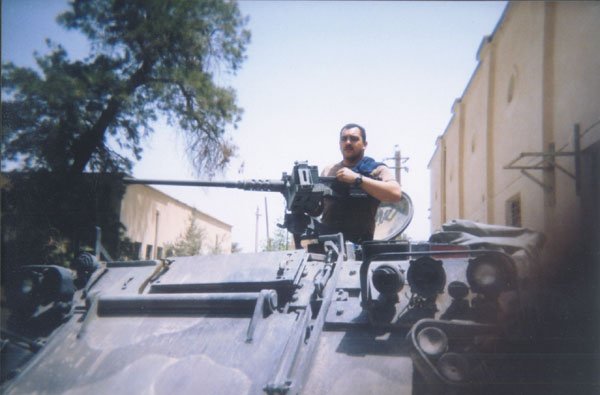As bombs pounded the U.S. base in the Iraqi city of Najaf, a
local family’s hearts beat faster.
As bombs pounded the U.S. base in the Iraqi city of Najaf, a local family’s hearts beat faster.
Army Cpl. Joe Kaho, 27, was among the solders who took over the former Spanish base in Najaf and were met by intense mortar attacks May 3.
“He sent me an e-mail saying that he got there safely, that they have a shower in the building and a bathroom, which he was really happy to get,” his sister Angela Paddon said.
Kaho also described the shelling of Najaf, saying the mortar blasts were so close to his barracks that the front steps were blown off, and e-mailed a picture of an American tank with black clouds rising behind it.
“He said ‘Thank God, they don’t know how to operate them, otherwise there would be a lot more casualties,’ ” Paddon said.
Soldiers don’t leave the base – snipers lurk outside – except to walk 1,800 meters in full gear to do laundry and eat. But at least it’s a hot meal after spending the weeks before arriving in Najaf hungry, eating only prepackaged military meals called MREs.
“He’s scared. He wants to come home,” Paddon said. “He says a lot of the guys there are mentally worn out. They’re tired.”
Now the family has someone else to worry about, Paddon said. A few weeks ago Kaho’s sister, Mia, the baby of the family, was told there’s a 90-percent chance she’ll be deployed to Iraq in September. The Pvt. 1st Class is a petroleum specialist with the Army stationed in Fort Hood, Texas. In Iraq, her job would be fueling tanks and Humvees, Paddon said.
Kaho was among the 20,000 U.S. soldiers whose stay in Iraq was extended another six months, which means he’ll likely be returning just as his sister is heading out.
He’ll also be away longer from his wife, Brenda, and their two children, Vanni, 7, and Alannah, 4. They live in Freiburg, Germany, where he was last stationed, and were anticipating a transfer to a base closer to home in Colorado. Now, Brenda and the girls plan to return to Gilroy for the summer.
Kaho’s mom, Karen, said he sounded depressed when he called to tell her he wouldn’t be returning in May. He told her his whole unit was upset because they were the first ones to go to Iraq in the 1st Armored Division.
“He was almost in tears,” she said. “He said, ‘You know, mom, when I talk to Brenda and she tells me the girls are having this problem, there’s nothing I can do. I feel so helpless. I feel so far away. They’re growing up without me.’ ”
When his unit arrived in Baghdad a year ago, there were no accommodations so they had no water, hot meals or beds. To help keep Kaho from going hungry, his family started sending care packages filled with food and other supplies.
“Mostly pre-sweetened Kool-Aid, baby wipes, food, Cup O’Soup, cans of Spaghettio’s. He said it’s so hot over there that you don’t need to microwave them,” his mother said.
They also send cigarettes.
“The first thing he looks for is cigarettes and letters, then the food comes later,” she said, laughing.
Before going to Iraq, Kaho wasn’t a heavy smoker. But he and several other soldiers picked up the habit to ease the stress, Paddon said.
Eventually, the troops moved into a barracks where they were able to eat a hot meal once a day, sleep on a cot and bathe.
Only days before the bombing in Najaf, eight soldiers in Kaho’s division were killed by a car bomb at a roadside checkpoint near Baghdad where his family thought he had likely worked.
“When you hear that a soldier has been killed it hurts because I know there’s another mother crying for the loss of her son,” his mother said. “On the other hand, if I didn’t have a faith and a trust in God to know that no matter what happens everything will work out, I would probably go insane.”
And it’s due to divine providence that her son is still alive, she said. He was transferred to Najaf a few days before the roadside bombing.
For Kaho’s mother, it’s her spirituality that keeps her going – and the phone calls.
Joe calls his family whenever he can. However, sometimes several weeks go by without a phone call. When he does call home, he and his mom usually don’t talk about the war but spend their time “chit-chatting about family and what everybody’s doing.”
“I don’t want him to live through it again telling me,” she said. “He’ll tell his brother all kinds of stuff, but those are brothers.”
In Najaf, he is able to use e-mail for the first time in months.
Paddon also watches the news reports closely. Her mom takes the opposite approach.
“It’s hard to listen to the news, which I don’t often do,” she said. “When I hear some tragic news, it really upsets me. I’m relieved it’s not my son’s unit, but then I’m heartbroken because it’s someone else’s son, daughter, father.”
She leans on the support she receives from the First Baptist Church. Anytime she gets worried, she requests prayers for her son.
“They have been tremendous as far as supporting us with prayers,” she said.
The Associated Press contributed to this story.














